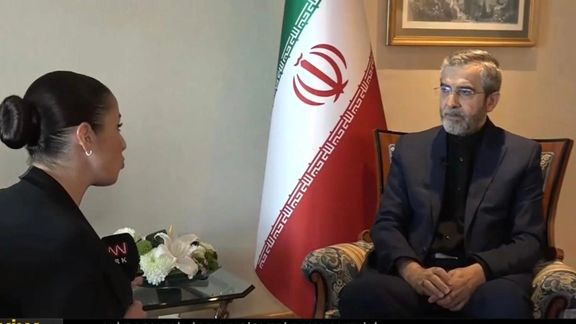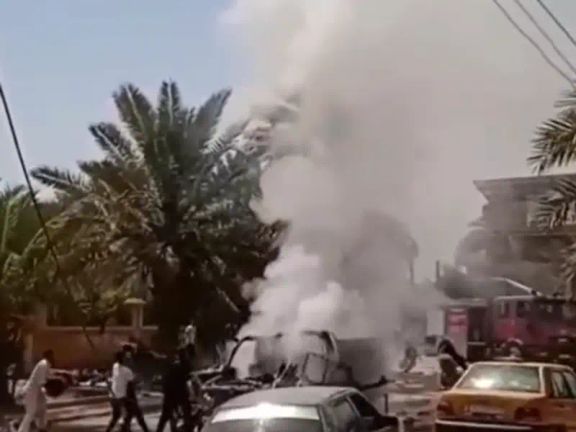Iran's Acting FM Issues Renewed Threats Against Israel

Iran's acting Foreign Minister Ali Bagheri Kani issued renewed warnings against Israeli military operations in Gaza and potential actions in Lebanon through its proxy groups.

Iran's acting Foreign Minister Ali Bagheri Kani issued renewed warnings against Israeli military operations in Gaza and potential actions in Lebanon through its proxy groups.
Bagheri, speaking to CNN TÜRK, said, "They [Israel] should not forget the defeat in 2006. If they want to fall from the Gaza swamp into the Lebanese well, we do not recommend it," he stated, referring to the second Lebanon war which came to an end after UN Resolution 1701.
Bagheri's comments were made at the Council of Foreign Ministers of the Economic Cooperation Organization of the Eight Developing Countries (D-8), during which he called for an outright boycott of Israel and levied heavy accusations against Western nations, particularly the USA and Europe, accusing them of abetting what he referred to as a "massacre" in Gaza.
The Lebanese terror group Hezbollah, Iran's largest and most powerful proxy, has recently intensified its conflict with Israel, which was triggered after the October 7 attack on Israel by Iran-backed Hamas, the Lebanese proxy joining the bombardment of Iran's archenemy. Rising numbers of drones and missiles are being launched towards Israeli territory with mass fires being ignited across northern Israel. The conflict in the north has left 100,000 Israelis displaced and similar numbers displaced from southern Lebanon.
In response, Israeli Prime Minister Benjamin Netanyahu declared on Wednesday morning that Israel is "prepared for an extremely powerful action in the north" to counter the escalating assaults.
Israeli intelligence estimates indicate that Hezbollah has stockpiled approximately 150,000 rockets and missiles in southern Lebanon, all poised to target Israel.

The Swedish Ministry of Foreign Affairs has admitted that Iran's terror plots across Europe and its involvement with criminal networks in Sweden are “deeply concerning.”
The ministry said the revelations of plots on Swedish soil and abroad using Swedish crime gangs are being taken "very seriously".
"It is deeply concerning that a foreign power, in this case Iran, has allegedly used criminal networks to commit or instigate crimes in Sweden. The Ministry for Foreign Affairs has summoned Iran’s chargé d’affaires to stress how seriously we are taking this information," Swedish Ministry for Foreign Affairs’ Press Office told Iran International.
It follows recent reports from the Swedish Security Service (SÄPO), which revealed that Iran-backed terror plots aim to target Iranian dissidents in addition to Sweden's Jewish and Israeli community.
In January, an explosive device, said to be a hand grenade, was found inside the grounds of the Israeli Embassy in Stockholm and destroyed by the Swedish national bomb squad. The suspects were found to be part of a gang known as Foxtrot, hired under the behest of Tehran, according to Israeli intelligence agency Mossad.
In retaliation to the Swedish revelations, Iran summoned Sweden's temporary charge d'affaires last Saturday, denouncing the claims as "baseless" and influenced by Israel.
Last month, Mossad exposed a string of European plots funded by Tehran against Jewish and Israeli targets, including recent terror attacks at the Israeli embassy in Belgium.

Farhad Zare, the brother of slain Iranian protester Milad Zare, was arrested on Thursday and transferred to Babol’s Mati Kola Prison in the central-northern part of the country in Mazandaran province.
According to pro-bono Dadban Legal Group, Farhad will be serving a one-year sentence simply for advocating for justice for his brother Milad.
In April, Babol’s Revolutionary Court convicted Farhad to one year in prison.
Milad was shot by security forces at the back of his head on September 20, 2022, during Iran’s Woman, Life, Freedom, uprising in Babol, and reportedly died in hospital. Milad was killed only days before his birthday.
Farhad Zare had been repeatedly summoned and threatened by security agencies following his brother’s death.
Last month, the Babol Revolutionary Court sentenced him to one year in prison.
The charge against Farhad was reportedly “propaganda against the Islamic Republic”, a charge commonly used by the Iranian authorities against slain protestors’ families and activists.
Iran’s authorities have increasingly placed pressure on slain protestors' families, often building cases against them to stop them from seeking justice.
Moreover, on Thursday, Reza Babrnejad, the brother of another slain protestor of the 2022 protests, Mehdi Babrnejad, was arrested again after only days of being released on bail. In May Reza was reportedly arrested for allegedly posting stories on Instagram following Ebrahim Raisi’s helicopter crash.
Many such families have been arrested since the uprising. Last year, at least 70 family members of slain protestors, including nine children under the age of 18 were detained between March - September 2023, according to Human Rights Organization Hengaw. Farhad was among those arrested in September 2023.
Farhad’s family has been subject to ill-treatment and harassment at the hands of the Iranian authorities. Following Milad’s death, videos emerged online of heavy state security forces at a mourning ceremony for the 40th day after Milad’s death.
Amnesty International has condemned the harassment of slain protestors' families, urging the International community to call on Iranian authorities to respect the rights of freedom of expression of the victim’s families, and “quash all unjust convictions and sentences against them and drop all charges against those facing reprisals for speaking out.”

The court session for jailed Iranian Nobel Peace Laureate Narges Mohammadi was held in branch 29 of the Revolutionary Court of Tehran without her presence.
The court convened on Saturday to address the new charges of “propaganda against the state” brought upon Mohammadi because of her statements on sexual harassment and assault on Dina Ghalibaf and boycotting parliament elections held in March according to her lawyer Mostafa Nili.
Nili announced on X that he attended the court session as Mohammadi’s lawyer defending her case without her presence.
Mohammadi's Instagram page also published a post stating that she did not go to court and that her trial session was held without her.
Last week, it was announced on her Instagram page that she would not be attending the court session and an online petition was started demanding a public trial.
When the new charges were first announced in May, Mohammadi announced that she would only attend the court if the session was held in a public trial.
“You are obligated to hold a public trial with the presence of independent journalists, women's rights activists, human rights advocates, and my lawyers. I wish to be prosecuted in court with the testimony of witnesses of the sexual assaults committed by the Islamic Republic regime against women,” Mohammadi stated in a message sent from prison published on her Instagram page.
Her demand for a public trial was supported by 36 female political and ideological prisoners at Evin prison.
Before this, Mohammadi had faced three court trials for recounting incidents of sexual harassment and assault against detainees. Saturday’s court session marks her fourth trial for speaking out against such violence.
In April Iranian student and journalist, Dina Ghalbaf disclosed on X that she had been sexually assaulted by morality police officers during her arrest over alleged non-compliance of mandatory hijab laws at Sadeghiyeh metro station in Tehran.
Following this disclosal Ghalibaf was arrested and detained at Evin prison. Media affiliated with Iran’s judiciary, Mizan News denied Ghalibaf’s claims of sexual assault. Days after Ghalibaf’s detainment, in a message sent from Evin prison Mohammadi supported Ghalibaf’s claims and condemned the sexual assault against her.
As pointed out by Mohammadi’s lawyer the new charge brought against her additionally relates to her statements on Iran’s legislative elections held in March.
In February this year, Mohammadi called for a boycott of the March 2024 legislative elections, asserting that the elections were illegitimate and deserved both national sanctions and global condemnation.
Following Saturday's court session, Ghalibaf who was recently released from Evin prison took to social media to write in support of Mohammadi, adding that she had demanded for CCTV footage to be released.
Sharing a photo of her hand showing bruises caused by the violence she endured during her arrest, Ghalibaf wrote:
“Today is my birthday. I don't like this birthday and I can't celebrate it because on the very same day Narges Mohammadi was tried for publishing an audio file of what happened to me inside the Sadeghieh metro police station,” Ghalibaf stated.
Ghalibaf continued: “In all my statements, I have referred to the videos inside the Sadeghieh Metro Police Station and have repeatedly asked for videos to be shown that strongly documented my statements. I even identified the perpetrating agent in the video.”
Additionally, on Saturday, formerly jailed scholar Sedigheh Vasmaghi condemned Iran’s judiciary for prosecuting Mohammadi and demanded that instead of Mohammadi, the perpetrators of sexual violence should be prosecuted instead.
“When Dina Ghalibaf was brought to the women's ward at Evin, I was there. I heard her statements among other prisoners. She spoke of the behavior of the officer who arrested her. I also spoke with her individually and asked her about a few things. I urge that officer and others like him be prosecuted, rather than Narges Mohammadi, who raised her voice in objection,” Vasmaghi stated in an Instagram post.

A mysterious online game promising financial rewards has swept through Iran, attracting players who defy government warnings in their pursuit of wealth.
But what is the game and the craze all about? Why is it captivating the masses, and what is fueling the opposition against it?
What is Hamster Kombat?
Hamster Kombat, a swiftly expanding "play-to-earn" mobile game accessible through Telegram, debuted officially on March 25th. Within a mere 72 days, it had amassed over 116 million users.
This game lets players oversee a virtual cryptocurrency exchange, earning in-game coins that can later be converted into tokens.
The fundamental gameplay revolves around players selecting a cryptocurrency exchange they wish to manage and tapping on the central Hamster icon on the screen to accumulate profits in the form of in-game coins.
As players accrue more coins in the exchange's balance, its level increases, facilitating faster coin earnings.
What is the allure?
The users' hope is that the game will be listed on an exchange. Cryptocurrency listing, also known as crypto coin listing, entails introducing a newly launched cryptocurrency to an exchange platform, thereby making it publicly accessible for trading.

The game's resemblance Notcoin, a popular game in which some players achieved monetary gains, has also contributed to its appeal.
Moreover, it is essential not to overlook the simplicity of the game and the popularity of Telegram in Iran as the platform itself.
So, what could go wrong?
The game may lead to identity and data breaches, as experts have told Iran International.
“Since this game is NFT [non-fungible tokens], the ecosystem and platforms surrounding their use can directly lead to user tracking and data collection in different ways,” Sahar Tahvili, an AI researcher and the co-author of “Artificial Intelligence Methods for Optimization of the Software Testing Process” told Iran International.
"NFT" stands for a digital token of ownership usually purchased or sold using a cryptocurrency.
“This type of data is usually used for online marketing; however, it can also be used for identity fraud, phishing, social engineering, and other malicious purposes.
Aside from this, they also have this system where if you invite a friend, they will reward you, from which they can create a network of people, and discern their relationships and behavior patterns,” the expert told Iran International.
“Since people usually share their true identities and details when money is involved, their genuine digital identity could be accessible,” she added.
Telegram, founded by Pavel and Nikolai Durov, initially gained popularity for its stance against the Kremlin. But there are doubts concerning where the servers are based and possible threats as outlined by Forbes.
"Since its early days, Telegram has been infamous for shielding illicit content from authorities, playing the anti-establishment role . This type of separation can directly impact data security, performance, and compliance with different countries' regulations, depending on where the hosting servers are located and how they are managed. In this case, the actual game files and user data will be stored on RU-CENTER’s infrastructure in Russia," Tahvili said.
"On the other hand, the main servers of Telegram are also outside the European Union, which has raised concerns about compliance with the General Data Protection Regulation (GDPR). Considering the large number of end users on both Telegram messenger and the Hamster game, Telegram needs powerful servers that can handle and process this large amount of data. Therefore such huge servers need to be located in sufficiently cold climates (such as Siberia) where the data centers can use the outside air for cooling," the expert told Iran International.
Why is the Islamic Republic warning against the game?
"Storing such a large amount of personal data in a database outside of Iran might raise some concerns for the Iranian government. In fact, other countries could potentially access the personal data of Iranian citizens, which could be utilized for social engineering and phishing purposes," Tahvili told Iran International.
The game generally raises significant issues, such as data security and the harvesting of user data. However, the primary concern for Iranian authorities appears to be the high level of public engagement in Tahvili's opinion.
The Islamic Republic of Iran has restricted access to various messaging apps, replacing Telegram with local alternatives, the expert explained. However, domestic messengers have struggled to rival international messaging apps, largely due to their lack of appealing features and fears among citizens about potential surveillance.
"A filtered version of Telegram has now garnered significant attention in Iran, and the provided web-based game Hamster has attracted a large number of end users. Such online engagement with external applications, gathering a lot of attention, and having several million end users raises concerns for the authorities in Iran regarding applications that might be used to circumvent censorship and share news," the researcher said.
Why are citizens defying authorities' stance?
Individuals' motivations for exposing their data and identity may stem from a lack of trust in the ruling establishment, particularly in economic distress when the perceived risk seems minimal. Millions of Iranians have increasingly become impoverished since 2018 when the United States imposed sanctions. They see the slightest chance of earning money as a blessing.
Despite governmental warnings, the economic incentives offered by the game often outweigh cautionary advice.
This vulnerability is further exacerbated among those accustomed to living under a dictatorship, who may lack awareness of their privacy rights, rendering them susceptible targets for such games.
There is a pervasive lack of trust to the extent that if authorities issue warnings against a particular activity, the immediate assumption is that they seek exclusive control over it.
Conversely, if authorities support the activity, there remains suspicion that they have ulterior motives involving illicit activities.
What is the International stance?
Ukraine has emerged as a prominent state responding to Hamster Kombat.
The Ukrainian government website, specifically the Center for Strategic Communications and Information Security (Spravdi), has warned citizens against playing the game.
The concern stems from its Russian domain registration under the RU-CENTER Group.
“Given the legal obligations of Russian companies to store user data on servers and disclose it to law enforcement agencies upon request, this situation poses a potential threat to Ukrainians,” according to Spravdi's statement, published in May. “Personal data could be vulnerable to exploitation for undisclosed purposes.”
What is the Iranian official and media stance?
Ironically, the clerical government in Iran seems to agree with Ukraine. As the game's popularity grew in Iran, the media also took note, and soon, authorities, from police to hardliner clerics, began to issue warnings.
On Friday, the spokesman for Iran's National Center for Cyberspace issued a warning about Hamster Kombat, stating that money-earning games have “become an ideal platform for hackers and thieves.”
“Players of these games are advised to take extra care in protecting their information and accounts,” Hossein Deliriyan wrote on X.
Iran's Cyberpolice stated on Saturday that it is evaluating threats and damages and will announce the results soon.
Hamshahri Online, the website of the Tehran Municipal Newspaper, published opinions from senior clerics, including Ayatollah Nasser Makarem Shirazi, a hardliner, holding one of the highest ranks in Iran's Shiite clerical hierarchy, and Mohammad Mohammadi Golpayegani, Chief of Staff to Supreme Leader Ali Khamenei, regarding the purchase and sale of digital currencies.
Almost all of these clerics, except for Supreme Leader Ali Khamenei himself, explicitly forbid cryptocurrency trading and related activities, citing that "cryptocurrencies do not have a clear and precise source, and they can endanger the country's economy as well as circumvent sovereignty and launder money, they are therefore forbidden or unlawful.”
Khamenei has only stated that cryptocurrency trading should be in "compliance with the official laws of the country in this matter.”
Is there an official set of rules?
The legal status of cryptocurrency in Iran remains a grey area. While there were initial discussions in parliament about a potential ban, it was later clarified that this would only apply to state institutions, leaving the status of cryptocurrency for the general public uncertain.
The judiciary's website, Mizan, states that “in general, it is not legal to trade cryptocurrencies in Iran, but there is no law explicitly stating that trading cryptocurrencies in Iran is illegal or considered a crime.”
However, cryptocurrency mining, which involves verifying transactions and generating new tokens, requires “obtaining permission from the government.”
Nevertheless, in 2022, the state's intelligence ministry reported blocking over 9,000 accounts of 454 individuals used for illegal or undeclared currency exchanges. Based on the exchange rate during that period, the relevant trades amounted to 600 trillion rials, or approximately $2 billion.
Does the Islamic Republic employ a double standard in its approach to cryptocurrency?
Experts assert that the Iranian government has a self-inflicted “muddled relationship with crypto-currencies,” which facilitates evading sanctions by the government while also enabling illicit activities.
According to reports in Iranian media, significant cryptocurrency mining operations are conducted by influential or well-connected networks, along with certain Chinese companies leveraging inexpensive and subsidized electricity in mining facilities established within Iran. Such activities could only have been authorized by Iran's intelligence services and the Revolutionary Guard.
In April, the US Treasury Department urged Congress to pass legislation empowering the department to intervene in cryptocurrency-based terrorist financing and sanctions evasion methods. During a Senate hearing session, it was disclosed that the Islamic Revolutionary Guards (IRGC) had utilized cryptocurrency for funding certain entities.
In 2022, it was revealed that cryptocurrency exchange giant Binance processed Iranian transactions totaling $8 billion since 2018, despite US sanctions aimed at isolating Iran from the global financial system.

A car bombing struck the eastern Syrian city of Deir Ezzor on Saturday, resulting in the deaths of two fighters aligned with Iran.
According to the Syrian Observatory for Human Rights, the attack occurred near an Iranian cultural center when an explosive device detonated inside an SUV, potentially intensifying the ongoing conflict within the region.
The Syrian Observatory for Human Rights, a UK-based watchdog with extensive networks inside Syria, confirmed that the vehicle, packed with explosives, was identified as belonging to militias supported by Iran, and the blast not only killed two individuals but also injured several others.
Following the explosion, Syrian government forces and Iran-backed groups quickly established a security cordon around the impacted site, signaling the importance of the area and Iran's deep-rooted presence there.
Deir Ezzor, recognized as a stronghold for Tehran, hosts numerous Iranian, as well as proxy forces and institutions.
The responsibility for the bombing remains unclaimed, and it adds to the ongoing turmoil in a region marred by frequent attacks.
Earlier this week, an attack attributed to Israel in northern Syria near Aleppo resulted in the deaths of 12 people in an area where forces allied with the Iranian government were present.
On April 1, an intense airstrike demolished a building within the Iranian diplomatic compound in Damascus, killing two senior Revolutionary Guard generals and five other officers. These individuals were reportedly engaged in planning operations to escalate attacks against Israel. In response, Iran launched a significant missile and drone strike against Israel on April 13, which resulted in minimal damage as most of the projectiles were intercepted.